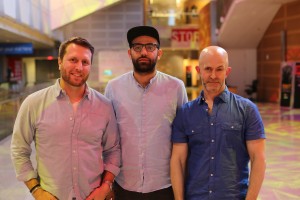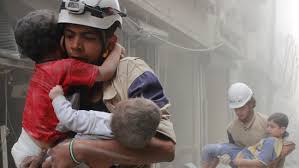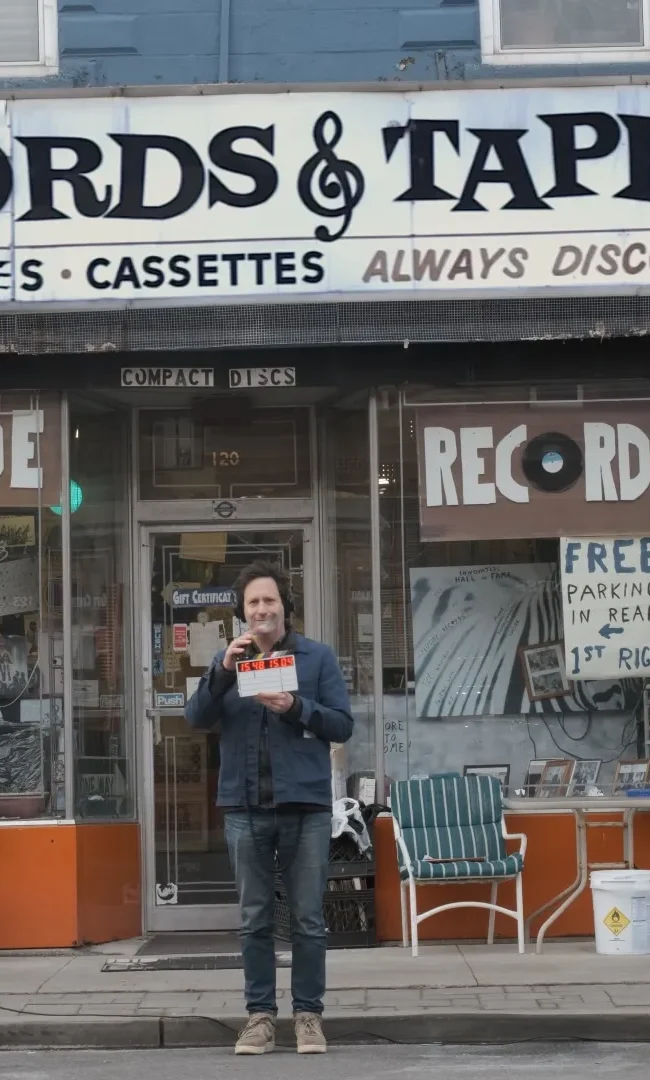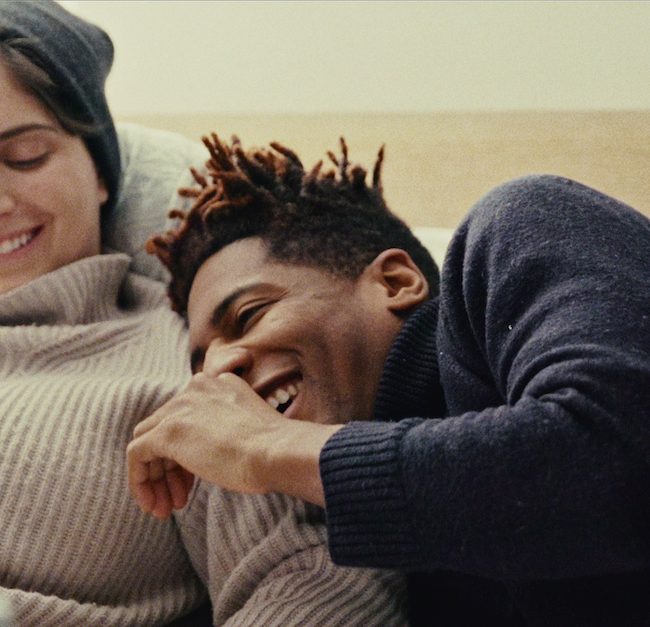A Conversation With Matthew Heineman & Abdelaziz (Aziz) Alhamza (CITY OF GHOSTS)
 I met with documentary director Matthew Heineman and one of his principal subjects, Abdelaziz (Aziz) Alhamza, on Sunday, June 18, 2017, at AFI DOCS 2017, to discuss his new film City of Ghosts (reviewed here). In the movie, Heineman profiles the heroic, life-and-death efforts of Raqqa Is Being Slaughtered Silently (RBSS), a citizen-journalist group made up of former Raqqa residents, which spends its time exposing the horrors of the Islamic State (ISIS). Raqqa, in Syria, was taken over by ISIS, and made its capital, in 2014. Comprised of footage smuggled out of Syria – under extremely dangerous circumstances – and of observational material gathered by Heineman, himself, in Turkey and Germany, where the expatriate activists reside in safe houses, City of Ghosts is a profound celebration of a free press and the high price of liberty. Here is a condensed digest of our conversation.
I met with documentary director Matthew Heineman and one of his principal subjects, Abdelaziz (Aziz) Alhamza, on Sunday, June 18, 2017, at AFI DOCS 2017, to discuss his new film City of Ghosts (reviewed here). In the movie, Heineman profiles the heroic, life-and-death efforts of Raqqa Is Being Slaughtered Silently (RBSS), a citizen-journalist group made up of former Raqqa residents, which spends its time exposing the horrors of the Islamic State (ISIS). Raqqa, in Syria, was taken over by ISIS, and made its capital, in 2014. Comprised of footage smuggled out of Syria – under extremely dangerous circumstances – and of observational material gathered by Heineman, himself, in Turkey and Germany, where the expatriate activists reside in safe houses, City of Ghosts is a profound celebration of a free press and the high price of liberty. Here is a condensed digest of our conversation.
Hammer to Nail: Matthew, with this film and Cartel Land, you are the master of the embed. Can you describe how you first contacted the members of Raqqa is Being Slaughtered Silently and convinced them to let you film them?
Matthew Heineman: So I was traveling around with Cartel Land, my last film, and ISIS was becoming front-page news, and I started reading obsessively about the group, trying to understand this phenomenon. I was deeply disturbed, like most people, and was also trying to see if there was a film to be made. I finally came across this article, by David Remnick in The New Yorker, about this group, Raqqa is Being Slaughtered Silently, a group of friends who banded together to expose the atrocities of ISIS, which took over their hometown of Raqqa. And right when I read it, I just knew that this was my way into the story. I reached out to the group through an organization that we had in common – the Committee to Protect Journalists – and about a week later, I was filming.
HtN: Given the constant threats on their lives, from ISIS, even while they live in Turkey and Germany, did you have any concerns about your own safety? Have you, yourself, been threatened directly, the way they are, in the film?
MH: I have not been threatened. To be honest, I don’t love talking about my own safety, because it pales in comparison to what they’ve been through. With Cartel Land, I was obviously in immediate danger, myself. This project was much different. I was with these guys who had been through more than any of us can ever imagine. They’ve been tortured by the Assad regime; jailed by the Assad regime; tortured by ISIS; jailed by ISIS; lost colleagues, friends and family members; been forced to flee and be on the run, which is when I caught up with them.
And so yes, I was with them as they were fleeing Syria and were “on the run,” moving from safe house to safe house, and there was this sort of omnipresent feel of ISIS, but I never saw it firsthand. And so the fear and danger were quite different than in my last film. But again, it pales in comparison to what the guys, themselves, have suffered, and especially what their colleagues still in Raqqa have suffered as they continue to smuggle footage, photos and information out of the city to the guys on the outside who then disseminate it to the world.
 HtN: Aziz, why did you decide to work with Matthew on this film?
HtN: Aziz, why did you decide to work with Matthew on this film?
Abdelaziz Alhamza: So, we decided to do this film because we knew it was going to be a tool to spread our message out. We knew that with this documentary, we would be able to reach millions of people around the world and draw attention to what is going on in Syria – and Raqqa, specifically – and let the people know about our story and our struggle against ISIS and the Syrian government. We hoped that with this movie, we would be able to make a change.
HtN: But some of that, you were doing, already. As we see in the film, you are disseminating information, very effectively. So, was there something about the documentary-feature format that you thought would bring something different?
AA: Yes, sure. So, what we were doing is reporting on what is going on in Raqqa and the daily news. We didn’t think to share our own stories. Everyone one of us has a specific story that’s never been told to anyone, and this documentary is the first time we have told them. And we hope that our own personal stories will draw more attention to the problems in Raqqa.
HtN: So, Matthew, you show some graphic killings in your film, though at times you blur out part of the image. It’s brutal. Were you worried about being too brutal? How did you decide what to show and what not to show?
MH: That was a balancing act that we debated and argued about at every step along the way, and most especially in the edit room. Every single frame, every single moment, every single note in the film was discerned and debated. But for me, and for us, I think we didn’t want to shy away from the violence, because to do so would have not done justice to the reality and the fear and the danger that the citizens of Raqqa live with every single day. And so we wanted to let audience members feel that same fear – that same horror – that they felt. At the same time, we didn’t want people to run out of movie theaters or turn off their TVs – however they’re watching films, these days – and so it was very much a balancing act. And I think it’s up to you and others to decide if we achieved the right balance.
HtN: I think it’s appropriate. I think you need to see that brutality. It supports the rest of the film. Now, did you ever have any concerns that you might be showing too much of the safe houses in your film, or did you know that by the time the movie would come out those safe houses would be different, so it wouldn’t be a concern?
MH: When we started making this film, we had very transparent conversations with Aziz and the rest of the guys about the ramifications of making this film, the danger that it might put them in, as well as the ramifications of what happens when the film gets out to the world, and the increased threat-profile they will have as a result of that. We were extraordinarily careful about how, when and where we shot. We always communicated with the group through encrypted means. We were extraordinarily careful in the edit room, to make sure that we didn’t inadvertently show something that might put them in danger. We allowed the guys to review the film, for safety, to make sure, again, that there wasn’t anything that would put them in danger. I can’t go into detail, but the shots that are in the film are not putting the guys in danger.
HtN: Aziz, since this film has started to come out, or since it’s wrapped, has anything changed for you?
AA: No. We haven’t lost anyone. We’re doing the same things. For sure, the situation in Raqqa is changing day after day, but so far, since the film hasn’t come out anywhere but in film festivals, so far, we are still waiting for the release, to see if anything will change for us. After the release, we will see the real impact. So far, we have gotten great feedback after festival screenings, from news organizations writing good reviews of the movie, but we’re still waiting for the official release, in July, to see what the real impact will be.
HtN: In the film, we see the challenge of getting footage out of Raqqa, and it becomes more difficult as ISIS takes down satellite dishes. Are you still able to get footage out from Raqqa?
AA: Yes, we are still able to get footage. We were able to get the news that ISIS will shut down most of the internet coffee shops, that they will take down the satellites, so were able to figure out three other ways to communicate. Fortunately, the first way is still working, but in case ISIS figures it out, we’ll switch to the second and then to the third. So it’s a good thing that we were able to get the information before ISIS acted.

HtN: So your work is ongoing and has not been interrupted.
AA: Yes.
HtN: Great! So, I love how the film becomes, by the end, a meditation on the uses of visual media as ideological propaganda. The desire to win that propaganda war almost supersedes ISIS’s blood lust. Do either of you have a sense of how and whether RBSS’s work is being seen within Raqqa, today?
MH: Aziz can speak to it more, but as we see in the film, their work was not just to show the rest of the world what was happening. They did tons of things within Raqqa: graffitiing walls with anti-ISIS slogans; they had a magazine within the city that they distributed to help provide counter-programming, if you will, to what ISIS was doing. So they did a lot of work, and they continue to do a lot of work within the city.
AA: So even with the difficulties of communicating through the internet, we are still getting photos from the local people. It’s a way to show how they support our work. And as Matthew said, we do all kinds of work within the city: graffiti campaigns, poster campaigns …
HtN: Which we see in the film.
AA: Yes. And the main part of our work is the magazines. Through these magazines, people get to know us. We started to get very famous in the city, especially when we started our campaign, because ISIS arrested many people and accused them of working with us, because they had liked our Facebook page. So, with all this activity – the messages, the photos, the videos, the information that we get daily from the local people – we know that our work is familiar to the people in Raqqa. And many people send us supportive messages, which means a lot to us, since it means that they know about us and support our work.
HtN: The most chilling images to me, in the entire film, despite some of the things I mentioned earlier, are those of young children being trained by ISIS for jihad. It reminds of the Nazis’ Hitler Youth camps. Has that changed, or are the children still being trained, as far as you know?
AA: So, when ISIS took over Raqqa, the first thing they focused on was the children, because they don’t have enough knowledge to know if ISIS is good or bad. And since most people had no jobs once the Syrian government collapsed and ISIS arrived, and therefore no salary, ISIS started to target the children by playing games with them and giving them dollars or mobile phones, things the families could not offer. So, the children started to think of ISIS as good people and decided to join. That’s how they started to recruit the children. And then they were sent to ISIS ideology camps, and then to ISIS armed camps. And every single child who graduates from these camps is required to do an execution, beheading a toy, an animal, even a man. And we focused on this issue in our magazine. The number of children joining ISIS is going up.
HtN: Frightening. Wow. Well, to get away from that horror, here’s my last question: Matthew, since you really were embedded with your subjects, in Turkey and Germany, how big was your film crew on this film? Was it just you, or did you have a team, with someone on camera and someone on sound?
MH: The way I like to operate – the way I feel I get my best material – is often operating alone. I often have a local producer there with me, but when I’m actually filming, it’s generally just me in the room, taking sound and shooting, myself. I feel like the types of films that I want to make – the type of film that City of Ghosts hopefully is – is a very intimate portrait that puts a human face to the subject. And for me to get that intimacy, it doesn’t happen over days, or weeks, but over months and months of gaining their trust and becoming a part of the fabric of their daily lives.
HtN: And was that the same on Cartel Land? Just you?
MH: Yeah.
HtN: Dual-system sound, or were you recording sound directly into the camera?
MH: Directly into the camera. Occasionally, on Cartel Land, we’d have a boom into a zoom, wild.
HtN: Got it. Well, gentlemen, thank you very much, and congrats on the film. It’s really important stuff and I applaud your work.
MH/AA: Thank you.
– Christopher Llewellyn Reed (@ChrisReedFilm)











